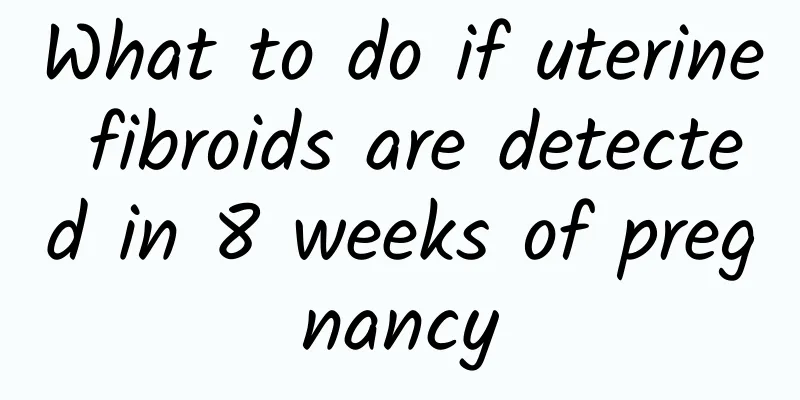What to do if uterine fibroids are detected in 8 weeks of pregnancy

|
Uterine fibroids are one of the most common benign tumors in the female reproductive organs and one of the most common tumors in the human body. They are also called fibroids and uterine fibroids. Because uterine fibroids are mainly composed of the proliferation of uterine smooth muscle cells and a small amount of fibrous connective tissue exists as supporting tissue, they are more accurately called uterine leiomyoma. They are also called uterine fibroids for short. Most patients are asymptomatic and are only occasionally found during pelvic examination or ultrasound examination. If there are symptoms, they are closely related to the growth site, speed, degeneration and complications of the fibroids, and the size and number of the fibroids. People with multiple subserosal fibroids may have no symptoms, while smaller submucosal fibroids often cause irregular vaginal bleeding or menorrhagia. Uterine bleeding is the main symptom of uterine fibroids, occurring in more than half of the patients. Cyclic bleeding is heavy, which may manifest as increased menstrual volume, prolonged menstruation, or shortened cycles. It may also manifest as irregular vaginal bleeding during the menstrual cycle. Submucosal fibroids and intramural fibroids are more common in uterine bleeding, while subserosal fibroids rarely cause uterine bleeding. Abdominal masses and compression symptoms Fibroids grow gradually. When the uterus is enlarged for more than 3 months or a large subserosal fibroid is located at the bottom of the uterus, the abdominal mass is often palpable, and the bladder filling is more obvious in the morning. Generally speaking, uterine fibroids do not cause pain, but many patients may complain of lower abdominal swelling and back pain. Increased vaginal discharge Increased uterine cavity, increased endometrial glands, and pelvic congestion can increase vaginal discharge. Infertility and miscarriage Some patients with uterine fibroids are accompanied by infertility or prone to miscarriage. The impact on pregnancy and pregnancy outcomes may be related to the growth site, size, and number of fibroids. Uterine fibroids do not grow after pregnancy. They are just not checked or discovered before pregnancy. As long as the fibroids are not submucosal fibroids, they will grow into the uterus and will not affect the pregnancy and the growth of the fetus throughout the pregnancy. Many people check for uterine fibroids after pregnancy. It does not affect the child. Check on time and remove them by cesarean section if necessary. |
<<: Treatment of cervicitis bleeding during pregnancy
>>: The main features of ovarian cysts
Recommend
The cause of ectopic pregnancy caused by fertilized egg migration
Before treating any disease, you must first under...
Dried ginger is better than fresh ginger! Homemade dried ginger powder for fat burning and weight loss
What should you eat to burn fat easily? If you ar...
You can use an electric rice cooker or an electronic rice cooker! Cut up 6 kinds of vegetables and throw them in, and DIY belly slimming soup is easily served
The more you eat, the more beautiful and thinner ...
Can chocolate cysts be cured completely?
Chocolate cysts are "lumps" but not &qu...
What are the common symptoms of uterine fibroids?
Symptoms of uterine fibroids mainly include menst...
What should I do if I have irregular menstruation and dysmenorrhea?
What should I do if I have irregular menstruation...
Introduction to the symptoms of chronic adnexitis
What are the symptoms of chronic adnexitis? Sympt...
Accurately identify the symptoms of clinical vulvar leukoplakia
The most frightening thing about vulvar leukoplak...
What causes uterine fibroids?
Uterine fibroids are a common benign tumor that o...
How to treat cervical erosion during pregnancy? 2 treatments for cervical erosion during pregnancy
Simple cervical erosion during pregnancy does not...
What are the methods of self-abortion? Will it have any adverse effects on the body?
In many cases, people often need to do something ...
What are the folk remedies for treating vaginitis?
What are the folk remedies for treating vaginitis...
Can I get pregnant with mild cervical erosion?
Cervical erosion, the name makes people feel terr...
What are the transmission routes of Trichomonas vaginitis?
For an infectious disease to spread, there must b...
Smart weight loss! First understand the mechanism of ATP turning into fat
People need to eat and maintain life by convertin...









